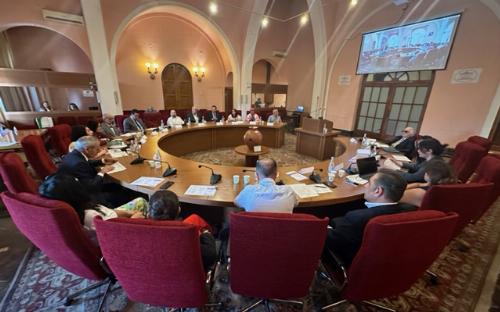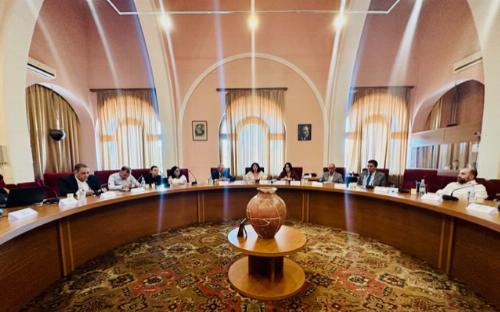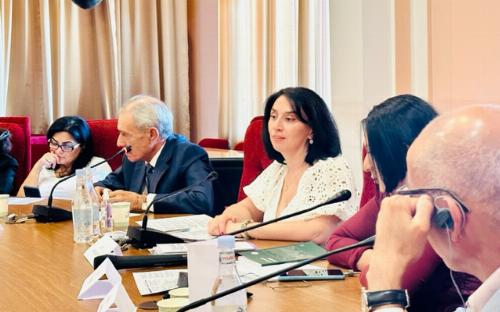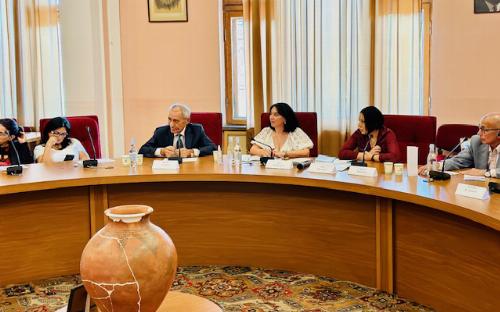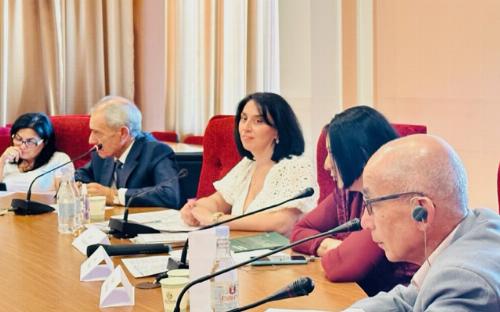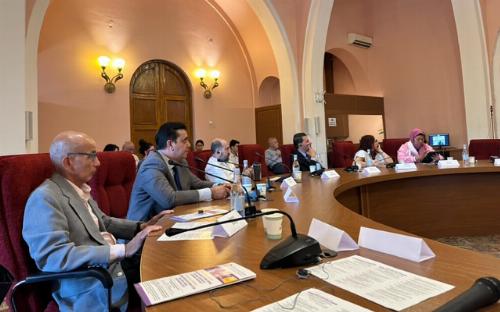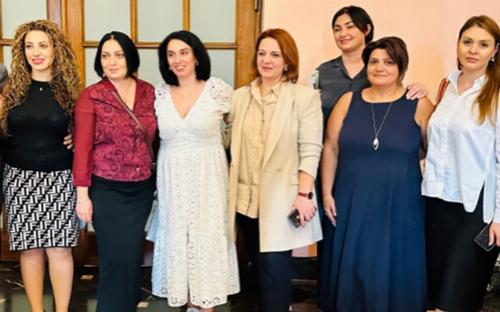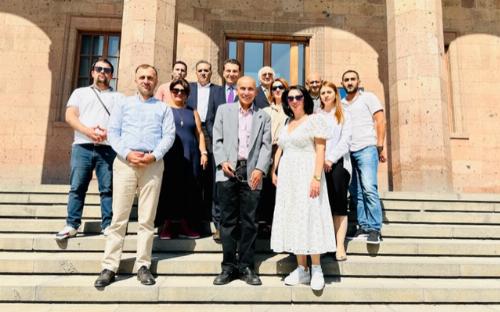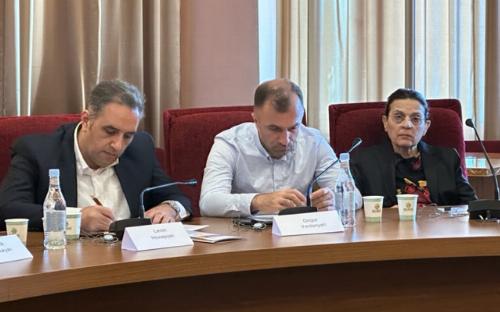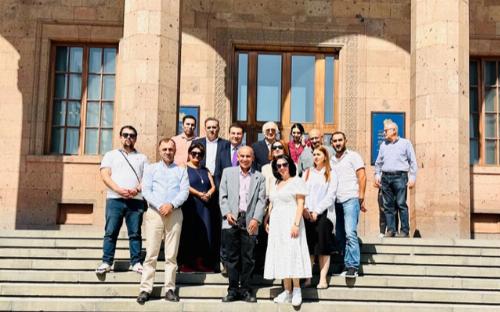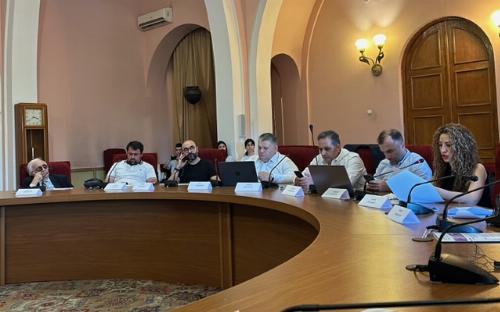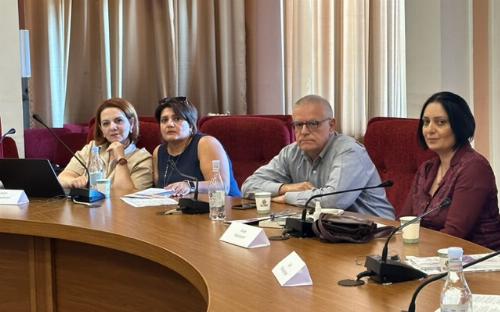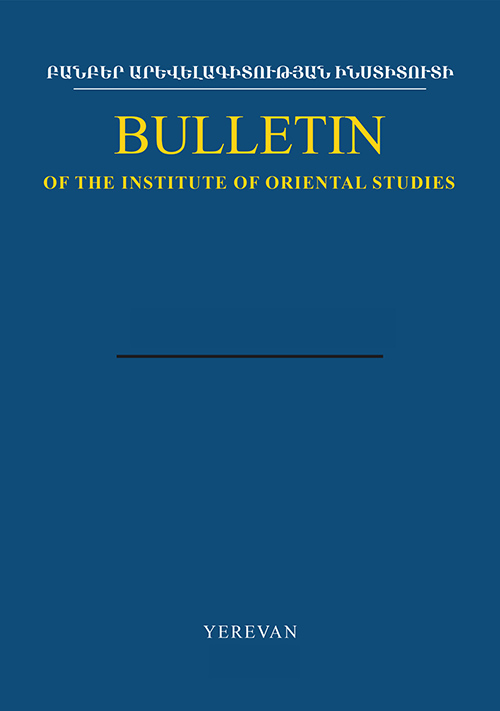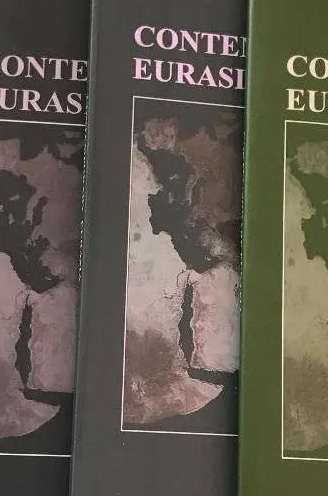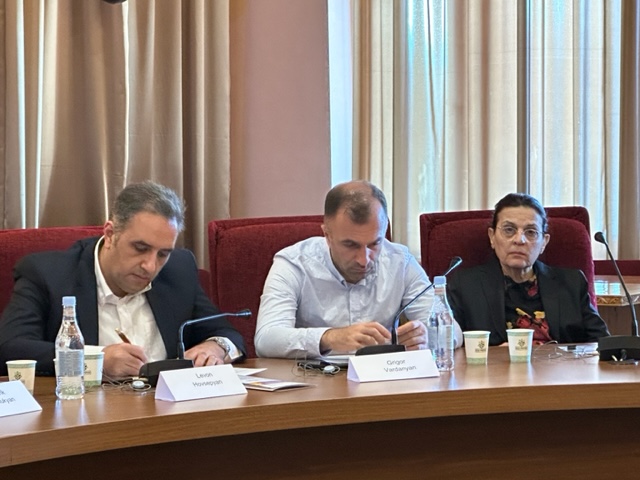
In this difficult and challenging period for Artsakh and Armenia, on September 20th, 2023 the Institute of Oriental Studies NAS RA organized an international conference entitled “THE SYRIAN CRISIS AND THE KURDISH FACTOR: INTRA-KURDISH, REGIONAL AND INTERNATIONAL ASPECTS”. It has been organized which within the framework of the research project “The geopolitical importance of the Kurdish factor in the Syrian crisis” (21T-6A153), supported by the Science Committee of the Ministry of Education, Science, Culture and Sports of the Republic of Armenia.
The conference aimed to be a platform of Science Diplomacy where the diplomats and academic circles through the corridors of Academia discussed the Syrian crisis, the Kurdish problem, intra-Kurdish, regional and international, etc.
Several diplomats have attended the conference - Ambassador of the RA to Tunisia and Morocco H.E. Dr. Arshak Poladian, Chargé d'affaires of the Embassy of the Republic of Iraq to the Republic of Armenia H.E. Dr. Suhailan M. Khaleel Al-Jubori, etc. We had guest speakers from the Near East South Asia Center for Strategic Studies, Washington DC, USA, Rewq Baghdad Center for Public Policy, Iraq, Egypt, etc. Leading research fellows from the Institute of Oriental Studies NAS RA participated in the conference.
In her welcome speech, head of the department of Arab countries welcomed all the guests and participants, expressed special thanks that in these difficult days for Armenia and Artsakh, the attendees found the strength to participate in the conference and thereby contribute to the broad discussion of regional issues. The participants honored the memory of our compatriots who died in Artsakh with a minute of silence. Dr. Lilit Harutyunyan presented the concept of the conference and discussed issues in general terms.
She noted that Syria has an important role in both the regional and sub-regional dimensions and the ongoing developments in Syria had a chain effect in other regional countries as well. The conference had 2 sessions. The reports presented in the first session were dedicated to intra-Syrian developments and different viewpoints of the Kurdish factor. In the second session, issues related to the impact of the Syrian crisis on the regional and international reality, the involvement of regional and non-regional actors (Russia, Iran, Turkey, USA, China, EU countries) in the Syrian conflict and its consequences were discussed.
Ambassador Extraordinary and Plenipotentiary of Armenia to Syria (2007-2018), Ambassador Extraordinary and Plenipotentiary of Armenia to the Republic of Tunisia and the Kingdom of Morocco, Prof. Arshak Poladyan, in his speech highlighted the importance of holding an international conference on the above topic. He noted that the discussions and reports on both the Syrian crisis and the Kurdish issue have scientific and applied importance and relevance. As an expert on the Kurdish issue, Ambassador Poladyan also spoke about the approaches of the Syrian government to the Kurdish issue and noted their features. In addition, the ambassador emphasized the consequences of speculations on the Kurdish issue by foreign actors.
In the core of his report "Syria as a geopolitical factor", Dr., Prof. Ruben Safrastyan emphasized several important issues. He singled out the following theses: the geopolitical significance of Syria and Russia's involvement in the Syrian crisis. Prof. Safrastyan also referred to the role of Iran and Turkey in the Syrian crisis, and spoke about a number of other regional states as well. The report highlighted the role of intra-Syrian processes, as well as the issues of Syrian refugees. In the concluding part of the report, the future vision of Syria from a geopolitical point of view was also discussed.
Director of Rewaq Baghdad center of Public policy Dr. Abbas al-Anbori in his "Kurdistan and the Central Government of Iraq: Challenges and solutions" report presented the characteristics of relations between Iraqi authorities and the government of Kurdistan, the main trends of economic and political contacts. He mentioned the contradictions that exist in bilateral relations.
Lilit Harutyunyan (PhD, Associate Prof.), Head of the Department of Arab Countries, Institute of Oriental Studies NAS RA, Tatevik Manukyan (research fellow of the Department of Turkey) in their presentation titled “Russia's narratives on the Kurdish issue in the Syrian conflict” discuss the evolutionary features of Russia's narratives of the Kurdish factor at the core of the Syrian conflict. The dynamics of the development of the contacts between Russia and Syrian Kurds in the fight against the “Islamic State” terrorist organization during the period when the possibility of Kurdish autonomy formation in Syria was outlined are also discussed. Meanwhile, some parallels are drawn with the communication between the USA and Syrian Kurds. Russia's perceptions of the Kurdish factor are also considered by combining the interests of regional and non-regional actors involved in the Syrian conflict and their perceptions of the Kurdish issue. A special reference is made to Turkey's involvement in the core of the Syrian conflict and its position on the Kurdish issue. The current processes in the Middle East, particularly since the beginning of the Syrian conflict in 2011, where international and regional players - Russia, the USA, China, Turkey, Iran, Iraq and Israel have had conflicting, often mutually exclusive interests, again raised the importance of the Kurds and the Kurdish issue, as well as its manipulation on the international stage.
In the context of the Syrian conflict, Russia's position on the Kurdish issue was initially predetermined by its geopolitical and regional priorities, and then also by its relations with Ankara, which, despite many contradictions, have recently been built on the basis of transactional pragmatism.
"Arab Spring" and the outbreak of the conflict in Syria in 2011 has ultimately sealed the “Kurdish card” in Russia's Middle Eastern foreign policy narratives. Syria became Russia's only actual stronghold in the Middle East. That was the main reason why Moscow tried to preserve President Assad's rule at all costs.
In 2014, after the formation of the terrorist organization "Islamic State" (hereafter, IS), which established its control over a significant part of Iraq and Syria, President Assad had to establish limited cooperation with the Kurds in the fight against IS terrorist groups.
It is obvious that Damascus later succeeded in liberating and protecting the northeastern regions of the country from IS militants as a result of the military activity of the Kurdish Democratic Union Party (hereafter PYD) and its armed unit, the People's Protection Units (hereafter YPG).
Russia's direct involvement in the war against IS in Syria on September 30, 2015, made cooperation between Moscow and the Kurds inevitable.
It is clear that the Kurds had become an important military and political component of the settlement of the Syrian conflict and seemed to have the opportunity to participate in the formation of a new geopolitical landscape in the Middle East. On the other hand, time didn’t work in favor of the Kurds, taking into account the reshaping of the interests of external actors in the region and the changes in the balance of power. The erupted war in Ukraine in 2022, the sharply growing contradictions between Moscow and Washington, also outside of Syria, put the Kurds in a difficult situation. And Turkey's military operations proved that the status of the Kurds in Syria directly depends on Turkey's position and ambitions, as well as the Russian-Turkish military-political tandem.
Russia's position has gained primary importance in this discourse. Throughout the Syrian conflict, Russia has sought to preserve the integrity and unity of Syria, but has not ruled out the possibility of Kurdish autonomy within it, in support of Kurdish wills. Russia offers the Kurds to negotiate with Syrian President Assad, to cooperate with the Syrian government forces, maintaining the territorial integrity of Syria, on the condition of demilitarizing all Kurdish armed groups and incorporating them into the Syrian armed forces.
Dr. Gawdat Bahgat (NESA strategic center, Washington D.C., USA in the core of the report "US Middle East Policy: New trends and realities" spoke about the transformations of American policy in the region, US-China competition, the withdrawal of American troops, the establishment of diplomatic relations between a number of Gulf states and Israel under the US umbrella, changes in the American position regarding the Syrian crisis, the return of Syria to the League of Arab States and the improvement of relations of Syria with “the Arab family”.
Arax Pashayan (PhD, Associate Prof.), Head of the Department of International Relations, Institute of Oriental Studies NAS RA in her speech titled “The Kurdish policy of the Syrian government in the beginning of the "Arab Spring": lost possibilities, uncertain future” discussed the approaches of the Syrian authorities in the beginning of the "Arab Spring" towards anti-government uprisings and upheavals of the Kurdish population living in the northeastern regions of the country.
Since the formation of the Syrian Arab Republic, the Kurdish population has not been considered as an ethno-religious minority, but -a part of the country's Sunni-Muslim community, therefore the possibility of the full realization of the Kurdish national rights has not been taken into account, as in the case of various Christian denominations/tawaif/. In addition, 15 percent of the nearly two million Kurdish population living in Syria /300,000 people/ did not have citizenship, therefore they were deprived of basic human rights. Currently, there have beenаaccumulated socio-economic problems in the northeastern regions of the country, particularly in Hasakeh province. On the other hand, there have been crystallised hostile perceptions and approaches between the Kurdish and Arab tribesthroughout different historical periods, which have complicated the possibility of finding the edges of cooperation, including the 2011 and later.
Since the events of the "Arab Spring", in response to Kurdish demand, the Syrian government made a number of practical proposals with a package of socio-ecоnomic reforms. The government used its ties with Kurdish tribal leaders and representatives of various Kurdish elites in Damascus to open a dialogue. In Kurdish circles mutually exclusive perceptions were formed regarding the Kurdish national problems perspective.
Over time, demands for Kurdish autonomy and independence emerged in various circles of Kurdish society. That process began to be coordinated by the Democratic Union Partyaffiliated with PKK. The Kurdish issue in Syria soon became the subject of geopolitical competition and was manipulated by various international actors (Turkey, USA, Russia, Iran, Israel, Iraq, Gulf countries, etc.). In the following years, Kurdish armed self-defense groups in Syria were involved in military clashes withseries of transnational military groups, militias and Turkish state.
The main conclusion is the following: The Kurds acted irresponsibe from the perspective of Syrian national security. They did not accept the government's proposals and got involved in long-term armed conflicts and clashes with Turkey and militant Islamists. As a result, the Kurdish issue in Syria became the subject of geopolitical speculation, the northeastern Kurdish and Arab regions of Syria were occupied by Turkey. The Syrian war would have gone completely different if the Kurds had adopted a more flexible and balanced position and found edges of cooperation with Damascus. The speech discussed the following issues:1. The Syrian authorities' proposals for socio-economic reforms in the Kurdish regions, 2. The practical steps taken by the government, their successful and incomplete aspects, 3. Questions related to the perceptions of Kurdish problems in the Syrian elite, 4. The approaches of representatives of different Kurdish elites and the existing contradictions between them regarding the perspective of the Kurdish national agendas.
Levon Hovsepyan (PhD), Head of the Department of Turkey of the Institute of Oriental Studies NAS RA in his speech “Beyond security concerns and Kurdish threat: the broader: aspects of Turkey's military involvement in the Syrian crisis” argued that Turkey launched its first military operation in the sovereign territory of Syria in 2016 named ‘Euphrates Shield’, which later had its continuities. Turkey became one of the powers that had significant and crucial military-political involvement in the Syrian crisis. Though Turkey’s military engagements and continuous operations are being mainly discussed and analyzed within the context of the fight against the Islamic State and Kurdish forces nevertheless the determinants and many aspects of Turkish military engagement are broader and encompassing. In this topic, we aim to reveal and outline the broader aspects. Ignoring the broad aspects of Ankara's military involvement, a purely security and military-centric approach fails to highlight and reveal the domestic and external, geopolitical, and personalistic, leader-centered determinants of today's Turkey, which include ideological, identity, image, and other layers.
The report covers a wide range of issues, concerning the determinants of Turkish involvement in a variety of contexts including civil-military relations, revisionist foreign policy vision, Erdogan's image-making, new foreign political and security identity, proxy forces and hybrid warfare experience, regional power projection, new global role vision, multilateral transactionalism, etc.
Tatevik Manukyan (research fellow of the Department of Turkey) in her presentation titled “The image of Kurdish female fighters in the Syrian crisis: new manifestation of transformation and branding” mentioned that the Kurdish revolutionary fighting female guerrilla emerged in the Syrian crisis, with a vision of establishing a democratic, decentralized, and pluralistic society where women's self-expression and lifestyle would be free, spiritual, cultural, and knowledge-based, unrestricted by traditional patriarchal regulations. Since the first Women's Self-Defence Force (YPJ) formed in the Kurdish regions of Syria in 2013, women have become the backbone and primary force behind the transformation of the traditional value system of Kurdish society. Currently, about 40% of Kurdish self-defence fighters are female. The women's self-defence movement in the Kurdish regions of Syria is sometimes described as a women's revolution. Syrian Kurdish partisan women became a representation of the struggle against the Islamic State's terrorism; they made a serious contribution to the military frontline by heroically resisting that dreadful horror. Despite the atrocities of the terrorists, the Kurdish woman did not develop a victim's mentality at all, but on the contrary, their principle of living became the struggle, the slogan: "resistance is life".
In addition to fighting with weapons in their hands on the frontlines, Kurdish women partisans also undertook local, educational, and diplomatic missions, becoming an original brand to reveal the courage of the Kurdish woman's spirit and the essence of struggle.
Gor Gevorgyan (PhD, Associate Prof.), senior research fellow of the department of Arab Countries, Institute of Oriental Studies NAS RA in his speech titled “The role of Egypt in the context of Syria’s “return to the Arab family” (2013-2023),” mentioned that Egyptian-Syrian relations have traditionally play a key role not only in the Palestinian peace process and the Arab-Israeli confrontation, but also to some extent these relations determine the formation of the security environment in the Arab world, trying to help overcome various problems in inter-Arab relations.
However, at different stages in the history of bilateral relations there were also problematic periods, including the freezing of diplomatic relations, etc.
At the beginning of the 21st century, Abdel Fattah al-Sisi, who came to power in 2013 on July 3 as a result of a coup in Egypt, breathed new life into Egyptian-Syrian relations.
Egypt's efforts to establish regular relations with Syria are evidenced by Cairo's position regarding the Syria's readmission in the League of Arab States.
It can be noted that since 2019, Egypt, within the framework of inter-Arab meetings, had begun to consistently speak out and support the need to reconfirm Syria’s membership in the League of Arab States. At the same time, by supporting the return of Syria to the “Arab family,” Egypt qualitatively raised relations between official Cairo and Damascus to a new level.
In 2023, on May 7, at a meeting of foreign ministers of the Arab League held in Cairo, Syria reinstated its membership. The President Abdel Fattah AL-Sisi made significant efforts to return Syria to the “Arab family”.
Grigor Vardanyan (PhD), senior research fellow of the department of Arab Countries, Institute of Oriental Studies NAS RA in his speech titled “Syria’s readmission to the Arab League and restoring its relations with the Arab States” argued that the study is aimed at firstly scrutinizing the process of Syria’s readmission to Arab League in the first half of 2023, secondly to understand the internal and external motives and objectives of Bashar Al-Assad’s government and regional powers in admitting Syria to Arab fold. There are two research questions: 1. Why did the Syrian authorities conduct improving relations with Arab States? 2. What were the main internal and external factors impacting on the decision making processes within Syrian security elite while seeking support of the Arab States? Analyzing this staggering geopolitical move in the Arab World, discussing the real objectives of the changes, and given all the perspectives and thoughts of subject matter experts we draw own perspective on the theme and make our conclusions.
Anush Hovhannisyan, research fellow of the department of Turkey of the Institute of Oriental Studies NAS RA in her speech titled “The Puzzle of Turkish Foreign Policy in Syria and Syrian Kurds' Challenges” mentioned that for years Ankara has threatened to expand its invasion of eastern Syria and ethnically cleanse more areas of Kurds and other minorities along the border. This puts millions of people's lives in constant limbo. Eastern Syria has many minorities, including a historic Christian community and Yazidis. The People's Defense Units, or YPG, formed one of the key Kurdish groups that fought ISIS. However, Turkey accused it of being a "terrorist" group. Turkey used this as an excuse to attack the YPG, first in 2016 near Manbij and later in Afrin in 2018. This created a complex puzzle in eastern Syria. Basically, the beleaguered country is still divided and the remnants of the Syrian Civil War still dominate the landscape. For Ankara, the goal was to get the rebels to remove Kurds from areas like Afrin and along a "buffer zone" along the border, so it could expel some three million Syrians to these areas and "resettle" these Syrian refugees in formerly Kurdish areas. This was a cynical approach of Ankara – to use poor Arab Syrians who had fled to fight against poor Syrian Kurds, essentially destroying both groups. While the Kurds and other minorities in Syria get bombed Russia, Turkey and the US do high-level deals. For average people living in Eastern Syria the future looks bleak. They will either be ethnically cleansed by another Turkish invasion, or have to live with the Russian-backed Syrian regime. How they can overcome this challenge, what is the position of new Ankara government in Syrian issue- these and other questions will be analyzed in this talk.
Nazeli Navasrdyan (PhD, Associate Prof.), senior research fellow of the department of International relations of the Institute of Oriental Studies NAS RA in her speech “The Kurdish factor and Iran’s regional security interests in the context of the Syrian crisis” noticed that the Syrian crisis and the rise of Islamist forces created completely new realities for states with Kurdish populations (Turkey, Iraq, Iran, Syria), forcing them to reconsider both their internal and external political line on the Kurdish issue. The advancement of the Islamic State (ISIS) terrorist organization in Iraq and Syria required a great overstretching of forces from Tehran. Iran faced the problem of border security as well as various new religious, economic and political threats and challenges. As a result, Tehran intensified its military-political involvement in Iraq and Syria also in the direction of the Kurdish factor. As the Syrian crisis deepened, Iran began supporting the Kurdish forces fighting ISIS in order to protect Iraq's Shiite regions and preserve the regime of Bashar al-Assad in Syria. At the same time, it strongly defends the principle of the territorial integrity of Syria, negatively reacting to the models of establishing a new balance of power in the region by dividing country into Sunni, Shiite and Kurdish autonomies.
Mushegh Ghahriyan (PhD), senior research fellow of the department of International relations of the Institute of Oriental Studies NAS RA in her speech “Reasons and objectives of rapprochement between Gulf Arab states and Syria” argued that Syria's early-spring 2011 anti-government demonstrations rapidly turned into a full-fledged conflict. Syria is currently split into several areas where different factions are in control as a result of a war. However, if in the first phase of the war the events unfolded to the detriment of the Syrian government, then after 2015, the Syrian government forces, with the assistance of foreign allies, were able to alter the course of events, and as a result, the it regained control in various parts of the country. Consequently, the question regarding the removal of President Bashar Assad from power was effectively sidelined.
Right from the onset of the Syrian conflict, the Gulf Arab countries demanded Bashar Assad's resignation and extended substantial support to the anti-government forces. These states actively participated in isolating and boycotting the Syrian government within the Arab world, even allocating Syria's Arab League representation to the opposition.
However, as the conflict's dynamics evolved, the Gulf Arab countries gradually reassessed their stance towards Syria and Bashar Assad. They cautiously embarked on restoring diplomatic relations with Syria. Notably, in 2023, Syria successfully reclaimed its position within the Arab League with the support of these very countries.
The purpose of this topic is to analyze the reasons for the change in the position of the Gulf Arab countries. I employ the systemic level of the three-level foreign policy analysis as a framework. Simultaneously, I draw parallels between the diverse policies adopted by the Gulf Arab countries in their interactions with Syria, explaining differences by the trajectory of the foreign policies of these countries and the peculiarities of decision-making process.
Aram Gasparyan (PhD), leading research fellow of the department of Arab Countries of the Institute of Oriental Studies NAS RA in his speech titled “The changes in Tunisia’s and Morocco’s positions on the Syrian crisis” noticed that the beginning of the armed conflict in Syria in 2011 had a notable impact on the relationships between Syria and several Arab countries, including Morocco and Tunisia. In the wake of the Syrian crisis, both countries criticized the actions of the Syrian authorities, citing anti-popular measures that resulted in a marked deterioration of diplomatic ties. However, more recently, the positions of both Tunisia and Morocco toward Syria have experienced significant shifts. These changes can be attributed to a combination of factors, including domestic and foreign policy considerations, alongside evolving regional and geopolitical developments.
Anna Antonyan (PhD candidate), department of Arab Countries of the Institute of Oriental Studies NAS RA in her speech titled “Israeli political and social narratives on the Syrian crisis” argued that the Syrian crisis that erupted in 2011 has also become a serious challenge to Israel's security, since it is a border state, and the processes taking place in Syria might affect Israel as well.
Israel also justified its concern that although Israel till now did not have diplomatic relations with Syria, in any case, ensuring the stability and predictability of realities in Syria was very important from the point of view of Israel's national security.
It was with this rationale that Israel declared its neutrality from the very beginning of the conflict, but it was quite natural that Israel would indirectly try to influence the ongoing events in Syria.
As a result of the expansion of the conflict, when Iran was also directly involved in the Syrian crisis, Israel became even more cautious in trying to indirectly prevent the increase of Iranian influence in neighboring Syria. Added to this was the activity of the Lebanese Shiite movement “Hizballah”, which also supports the government of Bashar al-Assad. The foregoing forced Israel to conduct even more consistent control, as well as to try to counteract the ongoing events in Syria and the strengthening of Iranian Shiite influence there.
In the end of the conference we had a very productive and interesting discussion. Issues related to the strengthening of the Turkish factor in the South Caucasus, the effects of Russian-Turkish relations, the complex situation around Artsakh, the tension in Armenia-Azerbaijan relations, etc. were also discussed.
We express our gratitude to all our colleagues participated in the conference.

